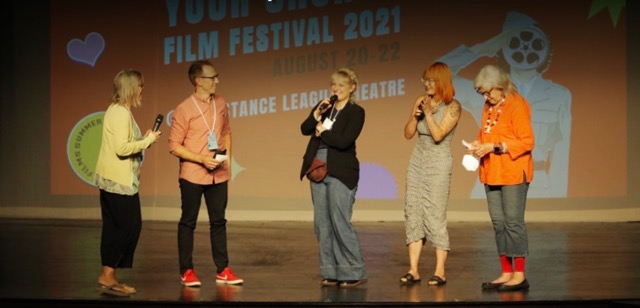
A mind is a balanced cooperative with numerous components working in tandem to achieve a goal. Filmmaker Afton Quast Saler understands how delicate this collaboration is, as well as the obstacles when this union is not copacetic. Awarded Best Documentary at the KCET Fine Cut Festival, Neurodivergent is Afton’s film description to the world of how it feels to battle one’s own brain in an attempt to feel “normal.” The conditions she deals with (ADHD) are not so obvious externally; to communicate this,
Ms. Quast Saler enlisted the talents of Rebecca Grass, as the sound designer and re-recording mixer, to sonically represent the constantly present yet subtle subtext of her condition. Sonically and visually, Neurodivergent balances an informative experience with the intermittent random stimulation that the film’s subject exists within on a daily basis. The chaos and randomness built into the very DNA of this film are profound in their ability to relay what life is like on a daily basis for Afton and yet so foreign to most of us. The result is an empathetic transference rarely seen in a documentary film. It’s an unintuitive notion both for the viewer and for a professional like Rebecca Grass who states, “For this film, it became my job to tailor a well plotted chaotic feeling. It was quite a pickle for my brain to find that thin line for things to be pleasantly and artistically messy, but not actually messy.

A genius move in communicating Afton’s perspective is this film’s vacillation between three basic approaches: collage style animation, interview, and video diary. Often it feels like switching television channels that are connected by a common theme. The differences are stark but there is a cohesive thread throughout. Few aspects of filmmaking are as under-appreciated by the audience as what produces the sonic identity of a film. While the dialogue of those being interviewed may seem basic, the use of sounds to convey an emotional state demands substantial creativity. Rebecca’s work requires understanding not only what is occurring in each scene and infusing it with the emotional intention she and Afton have agreed upon but also making a presumption about how the audience will receive it. The reception of a sound is a spectrum rather than a singular option. Ms. Grass describes, “It’s about the representation of ‘sound’ not replication of the sound. For example, the sound of a bunch of pills being thrown can’t be recorded as is because its actual sound won’t match up to what you think it will be like. You have to anticipate how it will be received and find a sound that matches this. When Afton’s husband googles ADHD and read off the description, the words fall from the screen as he speaks them. Rebecca attached retro video game sounds to this imaginary impact, creating a bridge to the memories Afton has of her childhood and the experience of these symptoms. The blending of sound design and sound mixing becomes evident during the part of this film that discusses suicide. Notably, Rebecca made the decision to leave the sound treatment starkly bare and pull more gravitas to the subject. With this scene as with so many others, Ms. Grass makes note of the interaction of music and sound stating, “I thought about if I’d want to go with siren sounds, like subjectively as if we are hearing the ambulance in her memory, but I eventually decided to go a different way because we didn’t want all the subjective sound effects to take the audience away from the truth. The balance between music and dialogue here was also important. You want the music to be just loud enough to know that it’s there but not so loud that it overdramatized this moment.”

When watching Neurodivergent, one is struck by how personal it is. Yes, this film is about one woman’s experiences and attempt to define her own struggle but there’s something much deeper than this. We have gained access to Afton’s intimate feelings and thoughts through the work of a team who is particularly inclined to feel and communicate at the highest level. Professionals like Rebecca Grass are much more than the technical skill they possess; they are able to transfer emotions because emotions are their greatest skill. Ms. Grass states, “My experience with the director and myself was just amazing. I think everyone would agree, throughout one’s career, not all the projects you do add value into your own personal life. I am able to fully engage my whole being, my feelings and my emotions into something to help attain someone else’s ‘vision.’ It is very different being an artist but you are doing your art under the direction of someone else. This project made it all worth it. I thought to myself, Jesus, god knows when the next project like this will come.”
Writer: Arlen Gann


Be the first to comment on "Neurodivergent: Rebecca Grass’s Sonic Approach to a Unique Mind"